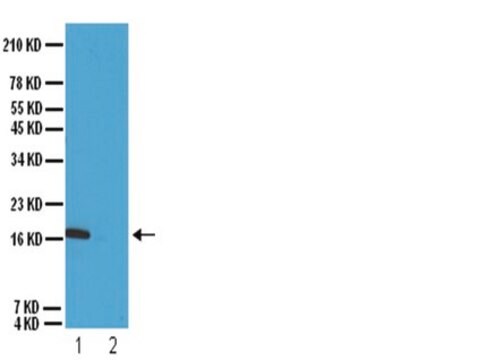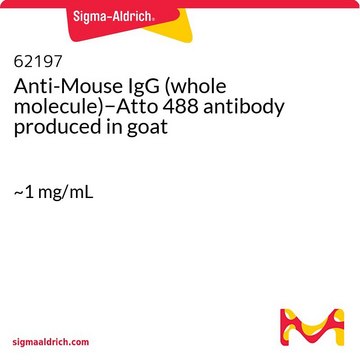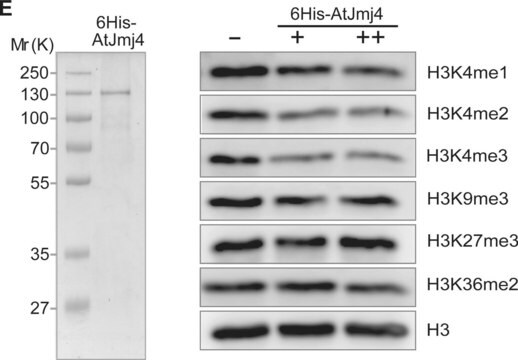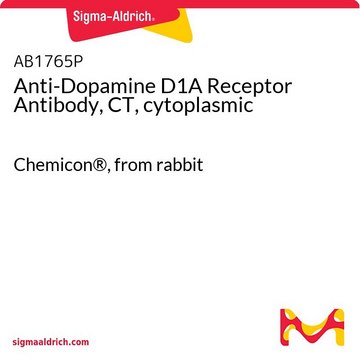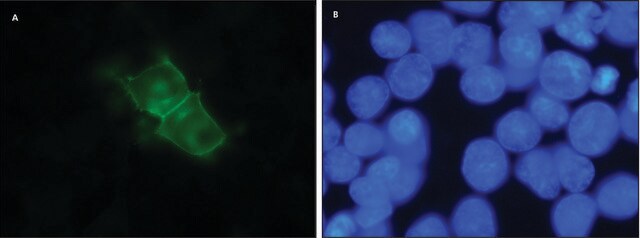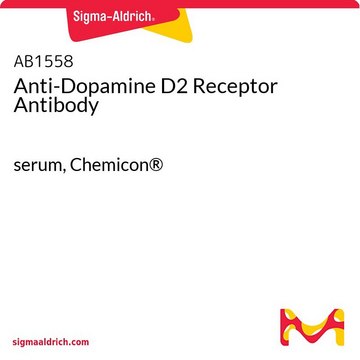ABE250
Anti-dimethyl Histone H3 (Lys4) Antibody
from rabbit, purified by affinity chromatography
Synonym(e):
H3 histone family, member T, histone 3, H3, histone cluster 3, H3, H3K4me2
About This Item
Empfohlene Produkte
Biologische Quelle
rabbit
Qualitätsniveau
Antikörperform
affinity isolated antibody
Antikörper-Produkttyp
primary antibodies
Klon
polyclonal
Aufgereinigt durch
affinity chromatography
Speziesreaktivität
mouse, rat, human, chicken
Methode(n)
ChIP: suitable (ChIP-seq)
dot blot: suitable
immunocytochemistry: suitable
western blot: suitable
NCBI-Hinterlegungsnummer
UniProt-Hinterlegungsnummer
Versandbedingung
wet ice
Posttranslationale Modifikation Target
dimethylation (Lys4)
Angaben zum Gen
human ... HIST1H3F(8968)
Allgemeine Beschreibung
Spezifität
Immunogen
Anwendung
Epigenetik & nukleäre Funktionen
Histone
1:500 dilution from a representative lot detected Histone H3 in NIH/3T3 and A431 cells.
Dot Blot Analysis:
1:1,000 dilution from a representative lot specifically detected Histone H3 in a Lys4 dimethhyl modified histone H3 peptide while not detecting potential cross-reacting peptides corresponding to other modified and non-modified histones.
Chromatin Immunoprecipitation Analysis:
Sonicated chromatin prepared from HeLa cells (1 X 10E6 cell equivalents per IP) were subjected to chromatin immunoprecipitation using 4 µg of either Normal IgG (Part No. 12-370), or 4 µL of Anti-Dimethyl Histone H3 (Lys4) (Part No. ABE250) and the Magna ChIP A/G Kit (Cat. # 17-10085). Successful immunoprecipitation of Dimethyl-Histone H3 (Lys4) associated DNA fragments was verified by qPCR using primers specific for the human GAPDH coding region.
Please refer to the EZ-Magna ChIP A/G (Cat. # 17-10085) protocol for experimental details.
ChIP-Sequencing
Chromatin immunoprecipitation was performed using the Magna ChIP HiSens kit (cat# 17-10460), 5 µg ofa representative lot of anti-dimethyl-Histone H3 (Lys4) antibody(ABE250), 20 µL Protein A/G beads ,and 5e6 crosslinked HeLa cell chromatin followed by DNA purification using magnetic beads. Libraries were prepared from Input and ChIP DNA samples using standard protocols with Illumina barcoded adapters, and analyzed on Illumina HiSeq instrument. An excess of twelve million reads from FastQ files were mapped using Bowtie (http://bowtie-bio.sourceforge.net/manual.shtml) following TagDust (http://genome.gsc.riken.jp/osc/english/dataresource/) tag removal. Peaks were identified using MACS (http://luelab.dfci.harvard.edu/MACS/), with peaks and reads visualized as a custom track in UCSC Genome Browser (http://genome.ucsc.edu) from BigWig and BED files.
Qualität
Western Blot Analysis: 1:1,000 dilution of this antibody detected Histone H3 on 10 µg of HeLa acid extract.
Zielbeschreibung
Verlinkung
Physikalische Form
Lagerung und Haltbarkeit
Hinweis zur Analyse
HeLa acid extract
Haftungsausschluss
Sie haben nicht das passende Produkt gefunden?
Probieren Sie unser Produkt-Auswahlhilfe. aus.
Lagerklassenschlüssel
12 - Non Combustible Liquids
WGK
WGK 1
Flammpunkt (°F)
Not applicable
Flammpunkt (°C)
Not applicable
Analysenzertifikate (COA)
Suchen Sie nach Analysenzertifikate (COA), indem Sie die Lot-/Chargennummer des Produkts eingeben. Lot- und Chargennummern sind auf dem Produktetikett hinter den Wörtern ‘Lot’ oder ‘Batch’ (Lot oder Charge) zu finden.
Besitzen Sie dieses Produkt bereits?
In der Dokumentenbibliothek finden Sie die Dokumentation zu den Produkten, die Sie kürzlich erworben haben.
Unser Team von Wissenschaftlern verfügt über Erfahrung in allen Forschungsbereichen einschließlich Life Science, Materialwissenschaften, chemischer Synthese, Chromatographie, Analytik und vielen mehr..
Setzen Sie sich mit dem technischen Dienst in Verbindung.